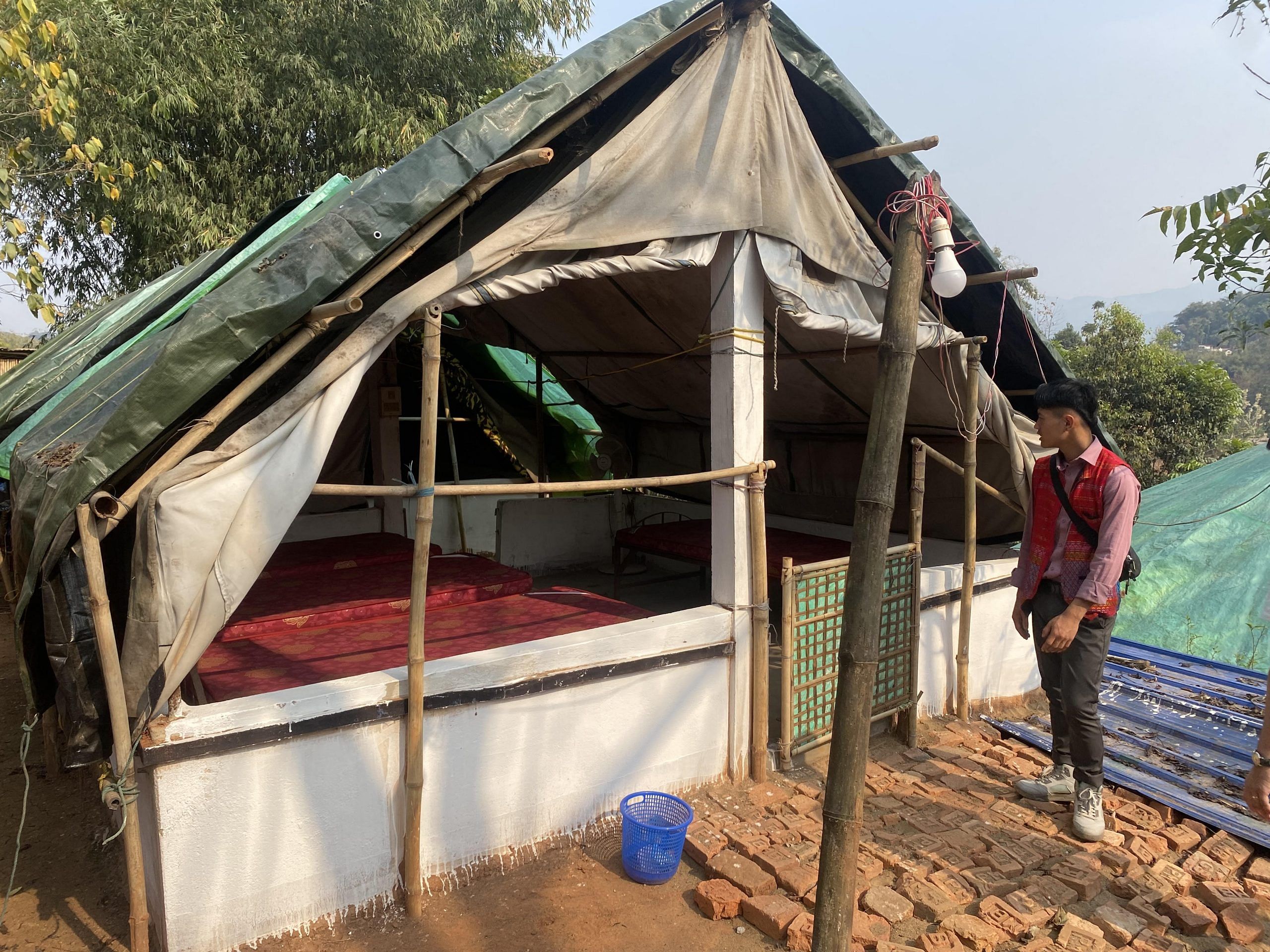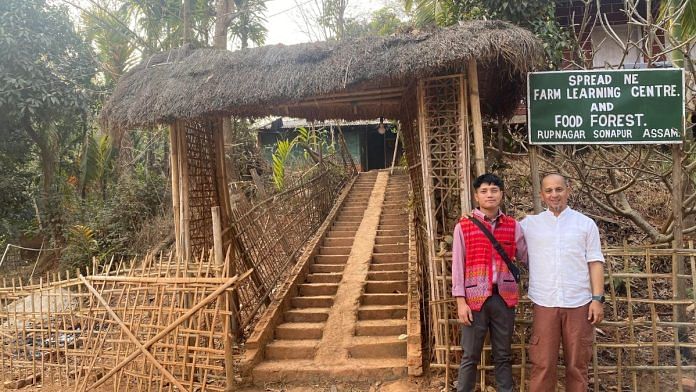Rupnagar: In the Northeast, most young people, when asked what they want to do for a living, will say they want to join the Army or a security agency.
So when Samir Bordoloi started his ‘Green Commandos’ programme, it came with all the markers of an Army role—a uniform, a disciplined lifestyle, a sense of pride and independence. But instead of putting grenades in the hands of his commandos, he handed them yams.
“I tell them to drop these yams wherever they please. They attract animals like wild boars. Then come the leopards. We planted banana trees, and bamboo, and in came the elephants,” says Bordoloi.
Nestled in a lush forest in Sonapur’s Rupnagar, a one-and-a-half-hour drive from Assam’s capital Guwahati, is his Farm Learning Centre and Food Forest. It serves as the Green Commandos’ base camp and it’s making farming cool again.
Eight years in the making, this centre has played a pivotal role in drawing youth—not just from Sonapur but from across the Northeast—back to the joys of farming as a livelihood, which, in Bordoloi’s words, is not a “glamourised profession”.

It all started when Bordoloi, an Ashoka fellow from the 2020 batch who describes himself as a ‘compassionate farmer’ on LinkedIn, was approached by a group of farmers from the Bodo tribe in 2016.
“They told me they had a piece of land in Sonapur, far away from their villages, which was susceptible to the land mafia. They asked if I could help them with farming there. It was basically a big forest. So I wondered, why cut down a forest and resort to mono-cropping when we can grow local food of various kinds?” he recalls.
Bordoloi, who completed his Bachelor’s degree in Agricultural and Extension Education Services from the Assam Agricultural University in Jorhat in 1997, realised early that organic farming was his calling—he preferred the practical to the theoretical. He began to travel to villages across the Northeast to gain more exposure to farming practices.
Inspired by what he saw, he began to realise that his mission was to help farmers become stakeholders in the ‘seeds to feed’ cycle, by championing native fruits, vegetables and herbs for self-sustenance as well as a means of income. Farm Learning Centre and Food Forest at Sonapur is one of his key projects to achieve this. Bordoloi lives in Rupnagar, and all his income comes from the forest.
Why cut down a forest and resort to mono-cropping when we can grow local food of various kinds
– Samir Bordoloi, founder, Farm Learning Centre and Food Forest
Today, this multi-storey food forest is home to over 5,000 species of local plants. The farmers grow everything from king chillies to gourds, pumpkin, roselle and squash at zero cost. No pesticides or insecticides are used, only natural compost. No tilling is done, and all of the resources this forest provides are reused, and recycled.

“One of the biggest reasons for rural-to-urban migration is because farming is not a glamourised profession. A kid does not want to be a farmer. Because food is corporatised, and there is an attempt to control the value chain,” he says.
In this, inherited food cultures are lost, he adds. “You will always be connected to the food you ate many years ago with your grandparents, that emotion will show in your eyes. But we don’t pass that on to our children. We are losing the traditional food system.”
Also read: Will saffron bring new riches to Arunachal? Women in Menchukha betting big on purple flowers
Bringing elephants back to the forest
It is from this mission that the ‘Green Commandos’ programme was born in 2017. The three-week module is “army-style” training. “We first do three days of camping, we make them run, we make them do squats,” says Bordoloi.
Then he sends them off into the forest, armed with yams, and ‘seed bombs’ (mud balls packed with seeds). “Later, they go back and are delighted to see the plants growing where they dropped the seed bombs,” says Bordoloi.
Today, the forest is frequented by a herd of elephants every year. They too play a crucial role. The route they take is where Bordoloi and his team of ‘agripreneurs’ have planted bamboo trees, pineapple, turmeric and king chillies. “The elephants walk over the turmeric, crushing it into chunks on the way. A customer bought that crushed turmeric online for Rs 500/kg!” he says.
Moreover, when the elephants reach up to the bamboo shoots, they loosen leaves that then fall onto the forest floor. This becomes mulch for the king chilli plants.
Pointing to a nearby village, he says its residents once came to felicitate him. “They thanked me, saying, ‘Because the elephants go through this forest now, they don’t come into our village and damage our rice crop’.”

Bordoloi has trained over 2,000 Green Commandos so far. And last year, he mentored four Green Hub-Royal Enfield Responsible Tourism (RT) fellows. The six-month RT fellowship aims to uplift community youth through training sessions and exposure trips under the guidance of livelihood and responsible tourism experts, who mentor the fellows in creating action plans for possible ‘Responsible Tourism’ destinations.
This is part of Royal Enfield’s CSR initiative, aimed at building resilience in communities and fostering sustainable change, particularly in the Himalayan region.
The elephants walk over the turmeric, crushing it into chunks on the way. A customer bought that crushed turmeric online for Rs 500/kg!
– Samir Bordoloi, founder, Farm Learning Centre and Food Forest
Shusaye Yobin, 29, is an RT fellow from Arunachal Pradesh’s Changlang district, who trained under Bordoloi and became a certified Green Commando. “The fellowship and this programme completely changed my thought process. I didn’t know that something like responsible tourism existed, how to balance nature and tourism,” she says.
After completing school, Yobin, who is from Hazolo, a village close to the Indo-Myanmar border, decided to become a trekking guide with her uncle’s help. A middle child with an older and a younger brother, her family sent her younger brother, but not her, to college.
Yobin is from the Lisu community, a minority tribe whose ancestors were mostly hunters. Hazolo is located close to the Namdapha National Park, and today, its residents, the Lisus, are mostly dependent on the forest. They also earn a livelihood out of farming, mostly growing cardamom.
Until a couple of years ago, there was no road link to the nearest town of Miao. The Hazolo residents had to trek for as long as a week to sell their produce or even buy things like soap, oil, and clothes. There was no health centre, no schools there until recently, either.
Yobin applied for the RT fellowship after hearing about it from an acquaintance. That’s how she ended up at Bordoloi’s food forest. “Initially, he sent us into the forest with seed bombs. We never gave importance to mulberry, but then Samir sir gave us cuttings and told us we could plant it wherever we wanted. Three months later, we revisited those spots, and the cuttings had grown into full flowering plants. It was incredible,” she says.
She adds that the fellowship helped her realise the importance of uplifting her community. “We at Hazolo have been farming for years, but we always dreamt of studying and becoming doctors. We didn’t give value to what we already know, and that is farming. We can show people our culture, our way of life, we make them taste our food, invite them to stay in our homes. It has exposed me to so many new ideas.”
Back at Hazolo, Yobin has already begun involving members of her community, friends and family in sustainable practices. “We have discussed employing some of the techniques taught to me by Samir sir. We have started waste management. Some people are sceptical, but most are excited and eager to know more,” she says.
Bidisha Dey, executive director of the Eicher Group Foundation, Royal Enfield’s CSR arm, says the fellowship is not just about giving young people a set of skills, but also giving them inspirational values. “It is not an academic programme, it is hands-on training with those who do this for a living,” she says.
The model makes sure that these programmes are resilient and can have a life of their own. “We want to keep community at the heart of everything we do and be a catalyst and ally.”
We didn’t give value to what we already know, and that is farming. We can show people our culture, our way of life, we make them taste our food, invite them to stay in our homes.
– Shusaye Yobin, Green Commando
Also read: Arunachal Pradesh is the Davos of vroom vroom vroom. It’s the motorsport hub of the rich
Passing it on to the next generation
One of the biggest responsibilities Bordoloi entrusts his green commandos with is to visit schools in their area and pass on some of what they learn to the students.
Bordoloi himself spends a lot of time interacting with school students in various villages of the Northeast and acquainting them with farming. It’s why he started the ‘Attracting Students to Agripreneurship’ (ASAP) programme.
He looks at them as an extension of the community. As part of the programme, he shows students of grades four and five how to farm. “Earlier, in their midday meals, they would get just rice, plain dal, and maybe potato if they were lucky. Now they grow herbs on their own, which are added to the dal to make it more nutritious. Their mothers call and say the children take delight in what they eat because they grew it themselves.”

School dropouts, or ‘outliers’ as Bordoloi prefers to call them, have trained under him and gone on to pass out from the National Institute of Open Schooling, to ultimately become educated farmers.
Today, the Food Forest attracts not just people from across the country, but various parts of the world including Germany and the Netherlands. Some come just to hear the sounds of the forest, the rustling of leaves and the chirping of birds, some come to escape the hustle and bustle of the cities and experience village life, and others to learn farming techniques.
As the sun sets over the forest, Bordoloi points to a dense pocket of tea bushes. This was where he had his first encounter with a leopard a couple of years ago.
Until then, a leopard was a rare sight in Rupnagar.
“I was holding a meeting and had stepped out to take a call. And there it was,” he says, motioning toward a spot about 50 metres away. “I didn’t move, we locked eyes. It was quite a sight! A few moments later, it just jumped over the fence and quietly made its way back into the forest.”
While such an incident triggers fear in anyone, for Bordoloi, it was a good sign. A sign that his painstaking efforts were working — the food chain had been resurrected, the forest was feeding everyone. The leopard saw him not as a threat, but as a part of the forest.
(This reporter visited the Sonapur Farm Learning Centre on an invitation by Royal Enfield to visit project sites that are part of the Green Hub-Royal Enfield Responsible Tourism initiative)
(Edited by Theres Sudeep)



